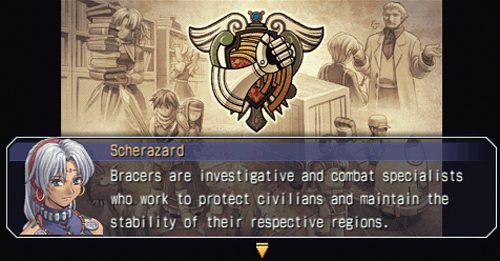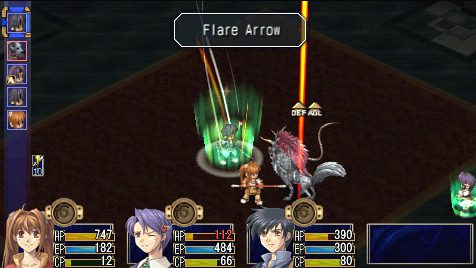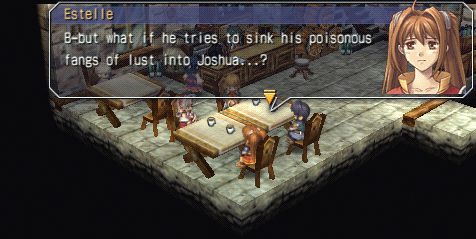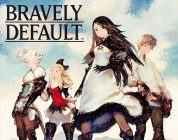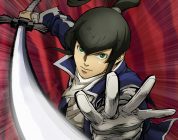I have a love/hate relationship with JRPGs. I cannot tell you how much I adored growing up with Chrono Trigger, Super Mario RPG, all the SNES Final Fantasies, Lufia and so on. I mean, this was a cornerstone of my childhood. But, there comes a time when we realize that those games (old-school Final Fantasy games especially) cater to a market that seems to despise itself. Hard-core RPG lovers who are happy to grind away for hours and hours without any consideration for what exactly they’ve accepted as “fun.” I won’t go into detail on that subject, since this is an actual review, but it is very relevant for this game: The Legend of Heroes: Trails in the Sky.
This is actually the first of a critically-acclaimed trilogy released half a decade ago in Japan, finally hitting American PSPs the nation over. But, you see, you can tell they had a trilogy planned right away. This game takes its oh so sweet time getting going. The first ten minutes of the game are spent with in-game cinematics detailing how our two protagonists, Estelle and Joshua Bright, came to become adoptive siblings. We learn that their father Cassius is a famous mercenary of a group called the Bracers, and Estelle and Joshua strive to become bracers themselves one day. Thats where gameplay starts, proving that you’re capable of joining this mercenary group that has branches all across the world of Liberl.
Once you become a bracer after a short mission, its all uphill from there. Not in the horrible grindy way, no. But in the “I have 3-5 new sub-missions after completing just one leg of the main quest?” way. The sub-missions aren’t terribly annoying or anything, but they are exceptionally repetetive. Expect to see yourself visiting the same areas over and over, and make sure you remember the layout of certain areas that don’t allow you to use the minimap. Oh how many times I got lost in that damned forest…
Completing sub-missions allows you to increase your bracer rank, get new items at each rank, earn money, and gain experience from the numerous encounters you will likely get in along the way. Which is all fine and dandy, and I certainly enjoyed having the opportunity to gain experience and money without hitting rabbits for hours, but the issue was that I couldn’t complete them on my time. You will automatically fail bracer missions you are assigned if you even think about progessing along the next leg of the main story, regardless of how minute the step is, because apparently that makes sense.
I remember early on, while still in the first town, I recieved a number of bracer missions after completing a part of the main quest. I completed most of them, and saw one about a lost kitten. “I love kittens!” I exclaimed. But I saw that I would get 3000 Mira (the currenecy in game) from completing the section of the main quest I was on, and I figured that kitten would be ok if I simply reported completing that part to the Bracers branch. Oh no. Turns out something happened, and there was a little red X next to that quest in my bracer notebook. I really hate “missable” content, especially senselessly missable content.
However, the combat redeems silly mission structure by a great deal. I consider something of a cross between Final Fantasy Tactics (my favorite PSone and PSP game by a long shot) and Grandia (or most entries in the Tales series), where you have turn-based strategic combat with several options based on movement, location and attack-type. Different weapons have different attributes, ranges, and areas of effect, and the same with spells. Every enemy has various resistances to the four key types of magic (wind, fire, earth, water, who would have guessed), but the game mixes it up by adding in a fifth type: time. This ignores resistances, and often has neat side affects to casting. While all-around, its slightly better to use because of this, you can’t underestimate the power of using strong elementally-aligned magic against creatures weak to it. Though I still love my time magic spell Hell Gate above all else.
A special note about magic in this game: its a system you’re already familiar with if you’ve played Final Fantasy VII (and I’d be shocked in anyone reading this hasn’t). While not exactly identical, its damn near close. So every character has a thing called an orbment, which is basically a magical watch. Orbments come in many varieties, and play a major story component. They inhabit every part of the world, so by the two-hour mark, you’ve probably heard the word orbment fifty times or more. But anyway, you have this orbment, and it has slots. You fit quartz into slots, which is refined from sepith, which you gain from defeating monsters. You also unlock slots in your orbment by buying them with sepith. Quartz is essentially materia, wherein it provides magic and ability increases to your characters depending on its effect and element.
Further, certain characters have restrictions on what types of quartz can be placed in certain slots (Joshua is strongly time-aligned, for example). While this system is interesting and adds some nice strategic elements to combat for each individual character, I can’t help but think materia whenever I place a quartz in my orbments. It lacks innovation, but does put a nice spin on the well-known system.
The story isn’t bad at all; in fact it gets genuinely awesome near the end. But it just takes sooooooo long getting there that it doesn’t take long to lose interest even after entering a new area. And when a game takes 50+ hours to complete, thats not good. But then again, maybe I’m just coddled on newer, westerner games where everything happens at once. I don’t know. But this story is worth the buildup. Just be prepared for that buildup.
I don’t have much to say about the characters, though I imagine they grow exponentially in the second and third chapters. It kind of shocked me to see two main protagonists, with Estelle, a tomboyish girl who kicks ass with a staff, taking the lead in most situations. None of the characters really seemed to jump out at me and scream “I’m super cool!” during my playthrough, and none of them really broke any stereotypes or expectations I had. I mean, from the first ten minutes of the game, you know Joshua has a past of some importance, so even late in the game after discovering what that entails, it didn’t really shock me. Thats not the say these stereotypes are boring; they’ve been done before.
On a slightly higher note (pun intended), the game succeeds in implementing sound well. Sound effects make sense and are used effectively in both combat and exploration, and the voice acting (including one Johnny Yong Bosch as Joshua) is pretty great. I mean, you’ll no doubt get annoyed with Estelle’s battle cries pretty early on, but thats her character. It fits, and it fits well. Further, the music is pretty fantastic. I’d consider listening to it in my free time, actually.
Overall, I’d suggest giving this game a try if you own a PSP. It does go above and beyond what is expected for a JRPG in a few ways, but holding onto its roots tightly (to some detriment). There wasn’t a moment of this game that was seriously boring, and it is definitely worth the time investment. Just take your time to complete it. Games are meant to be fun, not a grind!
Review
| Pros | Cons |
|---|---|
| Awesome strategic combat, beautiful score, decent voice acting | Slow story progression, senselessly missable content, not the most innovative game |
| Rating |

